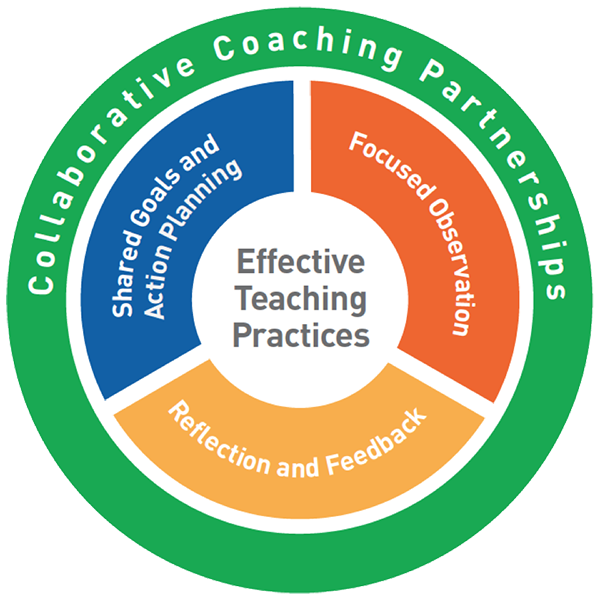Supporting Practitioners in their Implementation of Recommended Practices: Using Practice-Based Coaching
On This Page
Lise Fox, April, 2017
There is ample evidence that training alone often fails to directly influence the implementation of evidence-based practices with fidelity (Artman-Meeker, Fettig, Barton, Penney, and Zeng, 2015; Bransford, Brown, and Cocking, 2000; Joyce and Showers, 2002). Coaching is a promising professional development strategy that can be used to support the implementation fidelity of evidence-based practices by early childhood educators and early interventionists. This document describes the use of practice-based coaching that was developed from the literature on effective coaching elements and has been used with classroom teachers and early intervention personnel (National Center on Quality Teaching and Learning, 2012; Snyder, Hemmeter, and Fox, 2015).
What is Practice-Based Coaching?
Practice-based coaching is a cyclical process for guiding practitioners’ implementation of evidence-based practices that leads to positive child outcomes. Practice-based coaching provides a framework that can be used around any set of defined practices. The framework includes the following elements that are common to effective coaching approaches:
- Collaborative partnership: A collaborative partnership is established between the coach and the coachee where partners work together to set coaching goals and identify action steps. The other elements of practice-based coaching (i.e., goal setting and action planning, focused observation, reflection and feedback) occur within the collaborative partnership.
- Goal setting and action planning: An action plan guides coaching activities. The action plan is initially developed after using a needs assessment, practice checklist, or observation tool to identify current practice implementation and practices to strengthen. The action plan is collaboratively developed and focused on a few targeted practices that are operationally defined and broken down into implementation steps.
- Focused observation: The focused observation provides an opportunity to gain information about the implementation of the practice. The observation is “focused” in that the coach observes the context or activity where the practices in the action plan will be used.
- Reflection and feedback: After the focused observation is concluded, the coachee is asked to reflect on practice implementation and the coach shares her reflections. The coach also provides supportive and constructive performance feedback.
How is Practice-Based Coaching delivered?
Practice-based coaching can be delivered in a variety of formats. Coaching can be delivered by an expert, another practitioner in a similar role (i.e., reciprocal peer coaching), or by using self-guided materials. In addition, coaching can be provided live or using video and distance technologies. Practice-based coaching could also be implemented with a hybrid of these approaches (e.g., live observation to begin the process followed by distance coaching that uses video). Another option for coaching is the use of group coaching arrangements (Fettig and Artman-Meeker, 2016).
In the Early Childhood Technical Assistance (ECTA) Center, we trained and mentored coaches to guide the implementation of Division for Early Childhood (DEC) Recommended Practices by early childhood and early childhood special educators with a focus on increasing child engagement in learning opportunities and the achievement of positive outcomes. We also trained and mentored coaches to guide home visitors in their use of DEC Recommended Practices as they guided families in their promotion of child learning and positive outcomes.
Getting started: Practice-Based Coaching essentials
- Train coaches in the use of the practice-based coaching framework.
- Determine the format that will be used to deliver coaching (e.g., live, distance).
- Identify the practices that will be the focus of coaching.
- Determine how practices will be collaboratively identified for a coaching action plan (e.g., self-assessment, observation tool).
- Assign coach to coachees.
- Implement coaching components within collaborative partnerships and through multiple coaching cycles:
- goal setting and action plan development
- focused observation; and
- reflection and feedback.
- Continue the implementation of the coaching cycles until all of the targeted practices are implemented with fidelity.
Practice-Based Coaching on DEC Recommended Practices
The following ECTA resources can be used in the implementation of practice-based coaching:
- Reaching Potentials through Recommended Practices Observation Scales (RP2-OS): These tools were developed to provide coaches with a rubric for assessing the implementation of a sub-set of the DEC Recommended Practices that were identified as being most proximally related to child engagement in the learning opportunities provided by a caregiver or classroom teacher.
- Performance Checklists offer a self-evaluation of one's use of the practices that can be used to inform the action plan.
- Practice Guides for Practitioners might be used to help the practitioner think about how the targeted practice is implemented
References
- Artman-Meeker, K., Fettig, A., Barton, E. E., Penney, A., and Zeng, S. (2015). Applying an evidence-based framework to the early childhood coaching literature. Topics in Early Childhood Special Education, 35, 183-196.
- Bransford, J.D., Brown, A. L.., and Cocking, R. R. (2000). How people learn: Brain, mind, and experience, and school. Washington, DC: National Academies Press.
- Fettig, A., and Artman-Meeker, K. (2016). Group coaching on pre-school teachers’ implementation of Pyramid Model strategies: A program description. Topics in Early Childhood Special Education, 36, 147-158.
- Joyce, B., and Showers, B. (2002). Student achievement through staff development (3rd ed.). Alexandria, VA: Association for Supervision and Curriculum Development.
- National Center on Quality Teaching and Learning (2012). Practice-based coaching. Retrieved from: https://eclkc.ohs.acf.hhs.gov/sites/default/files/pdf/pbc-handout.pdf
- Snyder, P. A., Hemmeter, M. L., and Fox, L. (2015). Supporting implementation of evidence-based practices through practice-based coaching. Topics in Early Childhood Special Education, 35, 133-143.
Suggested citation:
Fox, L. Supporting Practitioners in their Implementation of Recommended Practices: Using Practice Based Coaching. Retrieved from: https://ectacenter/~calls/2017/learninglab-supporting.asp

